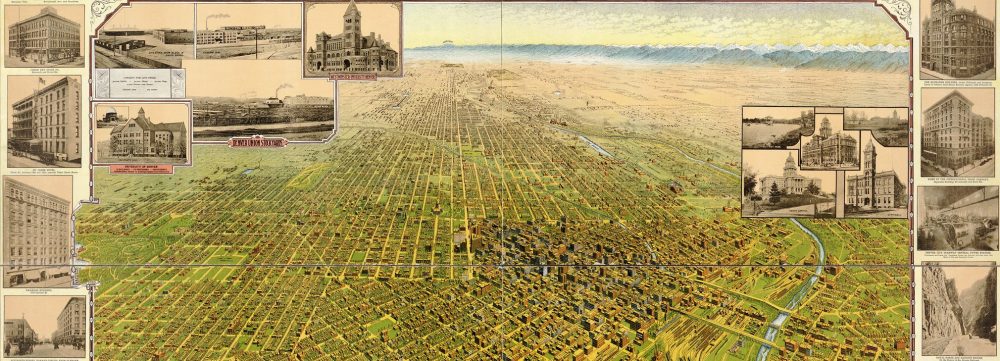Photo Credit: citizenswaine
Latin, Spanish, French, and a host of Native American languages – the names of the states paint a robust picture of our country’s roots. Here they are, in alphabetical order.
Alabama: From the Choctaw language albah amo, meaning “plant-cutters.”
Alaska: From the Aleut language alaxsxaq, meaning “mainland.”
Arizona: From the Basque arizonak, meaning “good oaks.”
Arkansas: From the French spelling of the name of the Quapaw peoples.
California: From the Spanish name of the fictional Queen Calafia, a character in the 16th century novel Las Sergas de Esplandian. This book was influential among Spanish explorers.
Colorado: From the Spanish colorado, meaning “reddish.” This designation referred to the Colorado River silt.
Connecticut: From the Algonquian quinnitukqut, meaning “tidal river.”
Delaware: From the French de la Warr, named after the first Governor-General of Jamestown.
Florida: From the Spanish pascua florida, meaning “flowery Easter”, so named for the season in which the state was discovered by the Spanish.
Georgia: Originally from the Greek ge, meaning “earth” and ergon, meaning “work”, this combination meant “farmer.” The state was named after King George II.
Hawaii: From the Hawaiian and originally Proto-Polynesian Hawaiki, meaning “place of the gods.”
Idaho: Of contested origin, but most likely from the Apache idaahe, meaning “enemy” and used towards the Comanches.
Illinois: From the French adaptation of the Algonquian ilenweewa, meaning “speaks normally.”
Indiana: From Latin, meaning “land of the Indians.”
Iowa: From the French Aiouez, named after the Iowa tribe of Native Americans.
Kansas: From the French, named after the Kaw tribe of Native Americans.
Kentucky: From the Iroquois language kenhtak or gedageh, most likely meaning “on the meadow.”
Louisiana: From the French and named after King Louis XIV of France. The original Frankish hluda, the root of the name, meant “famous.”
Maine: Most likely called after the French province of the same name.
Maryland: Named after Queen Henrietta Maria, wife of King Charles I of England.
Massachusetts: From the Algonquian, meaning “near the great hill.”
Michigan: From the Ojibwe language mishigami, meaning “large lake.”
Minnesota: From the Dakota language mnisota, meaning “cloudy water.”
Mississippi: From the Ojibwe language misiziibi, meaning “great river.”
Missouri: From the Illinois language mihsoori, meaning “dugout canoe”, for which the Missouri tribe was well known.
Montana: From the Spanish montaña, meaning “mountain.”
Nebraska: From the Chiwere language nibraske, meaning “flattened water” and referring to the plains surrounding the Platte River.
Nevada: From the Spanish nevada, meaning “snow-covered.”
New Hampshire: Named after Hampshire County in England.
New Jersey: Named after Sir George de Carteret, one of the founders of the largest of the British Channel Islands, Jersey.
New Mexico: From the Nahuatl language Mēxihca, named after the Aztec people.
New York: Named after the Duke of York, who would later become King James II of England. The name “York” is derived from Old English Eoforwic, which originally may have meant “Yew-Tree Estate.”
North Carolina: Named after King Charles I of England. The root of the word is derived from the Frankish karl, meaning “man” or “husband.”
North Dakota: From the Sioux language dakhota, meaning “ally.”
Ohio: From the Seneca language ohi:yo, meaning “large creek” and referring to the Ohio and Allegheny Rivers.
Oklahoma: From the Choctaw language okla, meaning “people” and homa, meaning “red.”
Oregon: From the Algonquian language wauregan, meaning “beautiful.”
Pennsylvania: Named after Admiral William Penn, the state’s name means “Penn’s woods.”
Rhode Island: Either from the Dutch rood eiland, meaning “red island” or for its resemblance to the Aegean island of Rhodes.
South Carolina: Named after King Charles I of England. The root of the word is derived from the Frankish karl, meaning “man” or “husband.”
South Dakota: From the Sioux language dakhota, meaning “ally.”
Tennessee: From the Cherokee language tanasi, the name of a Cherokee village.
Texas: From the Caddo language taysha, meaning “friend.”
Utah: From the Western Apache language yudah, meaning “high.” The Spanish used the word yuta to refer to the Ute people of the region.
Vermont: From the French vert, meaning “green” and mont, meaning “mountain.”
Virginia: Named after Queen Elizabeth I of England, known as the Virgin Queen.
Washington: Named after George Washington and the only state to be named in honor of a U.S. president.
West Virginia: Named after Queen Elizabeth I of England, known as the Virgin Queen. West Virginia separated from Virginia during the Civil War.
Wisconsin: From the Miami language wishkonsing, meaning “red place.”
Wyoming: From the Munsee Delaware language xwe:wamenk, meaning “at the big river flat.”

